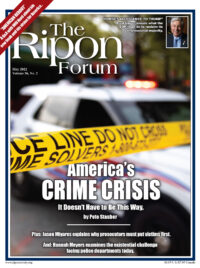
The third generation of bail reform is over. Like the second generation, it was unsuccessful. This time, the notion that jurisdictions can simply eliminate bail and move to some alternate concept of release from jail proved to be a mistake.
A quick review of what triggered this latest attempt at bail reform provides insight into the mistakes made and the most appropriate policy response.
In the early 1980s, Daniel Freed, a professor at Yale University, served as one of the principal architects of the no-money bail system, the “second generation” of bail reform first implemented in Washington, DC. He would eventually conclude that his experiment was a failure. He saw that denying bail or eliminating it altogether resulted in mass incarceration while having no positive effect on public safety.
The notion that jurisdictions can simply eliminate bail and move to some alternate concept of release from jail proved to be a mistake.
Although his experiment failed, Freed focused on the right issue when he asked Congress a simple question that is still relevant today: What do we know that empowers us to eliminate a fundamental constitutional right that the Founders of this nation and the drafters of the Judiciary Act of 1789 did not know then? In the 1980s, Congress apparently answered that question by concluding that some people were just too dangerous and simply should not be offered bail.
The result of that decision embraced in the Bail Reform Act of 1984 is that the percentage of defendants kept in jail pending trial has gone from 24 percent in 1983 to 75 percent in 2021. Thus, bail reform has led to a massive increase in pretrial incarceration at the federal level. Meanwhile, studies for a generation have failed to prove that denying the right to bail has any impact on crime. Confoundingly, many reformers continue to argue for the federal model, even though the process of setting and posting bonds has proven to be effective.
If we are so foolish and short-sighted as to eliminate a core constitutional right, we do so at our own peril.
So why do some still argue for the eradication of bail? To eliminate racial disparities in pretrial detention, they say. This is why New Jersey moved to its no-money bail system. Unfortunately, despite the expenditure of millions of dollars, the Garden State’s racial detention disparities are the same, with one caveat: anyone who is detained can never have the opportunity to post bail.
To avoid that outcome, New York State, among others, embraced universal release and the elimination of bail. The results were dismal. Under bail reform laws implemented in 2019, persons of similar risk who were released committed new crimes at a rate of 41 percent. Had they posted bail, the figure would have been approximately 19 percent.
The disastrous consequences of the New York reform policy that forced release and overruled judicial discretion has made national headlines. In the process, what became clear is that eliminating bail without other protections doesn’t work: both pretrial crime and failures to appear in court increased substantially.
So, what is the solution to achieving truly fair and effective bail reform? First, recognize the right to bail by our Founders. A thousand years of English common law and a settled system is more than capable of solving the ills that plagues us. Second, if jurisdictions adopt the policy of releasing on own recognizance with no bail, they should at the same time give judges and prosecutors the flexibility to detain those who are provable flight risks or dangers to the community.
As it turns out, Daniel Freed was right, as was Supreme Court Justice Thurgood Marshall, who ruled that Congress’ elimination of bail and the high court’s majority decision to allow it in the Salerno case, was a decision that would “go forth without authority and come back without respect.” 35 years of mass incarceration and a crime wave later, it is readily apparent that society functions a whole lot better when the right to bail is upheld. If we are so foolish and short-sighted as to eliminate a core constitutional right, we do so at our own peril.
Jeffrey J. Clayton is the Executive Director of the American Bail Coalition. He has worked as a public policy and government relations professional, and also as a licensed attorney, serving a variety of clients in legal, legislative, and policy matters. Mr. Clayton also worked in government service, representing the Colorado Judicial Branch and State Labor Department, and the U.S. Department of Transportation. He is also a prior Presidential Management Fellow and Finalist for the U.S. Supreme Court fellows program. Mr. Clayton holds a B.B.A. from Baylor University, an M.S. in Public Policy from the University of Rochester, N.Y., and a J.D. from the Sturm College of Law, University of Denver.




